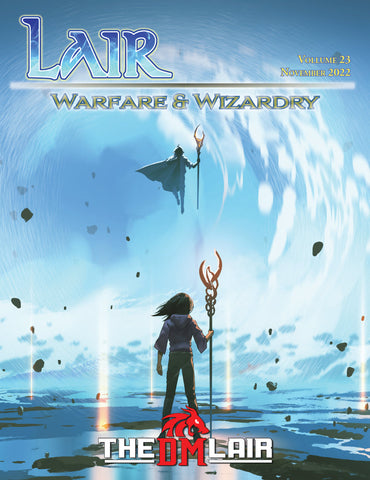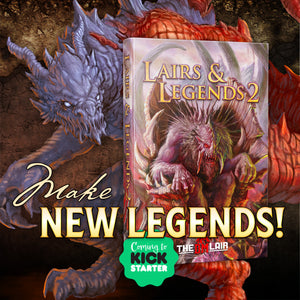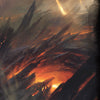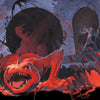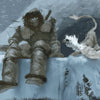Why Counterspell Is Horrible for D&D
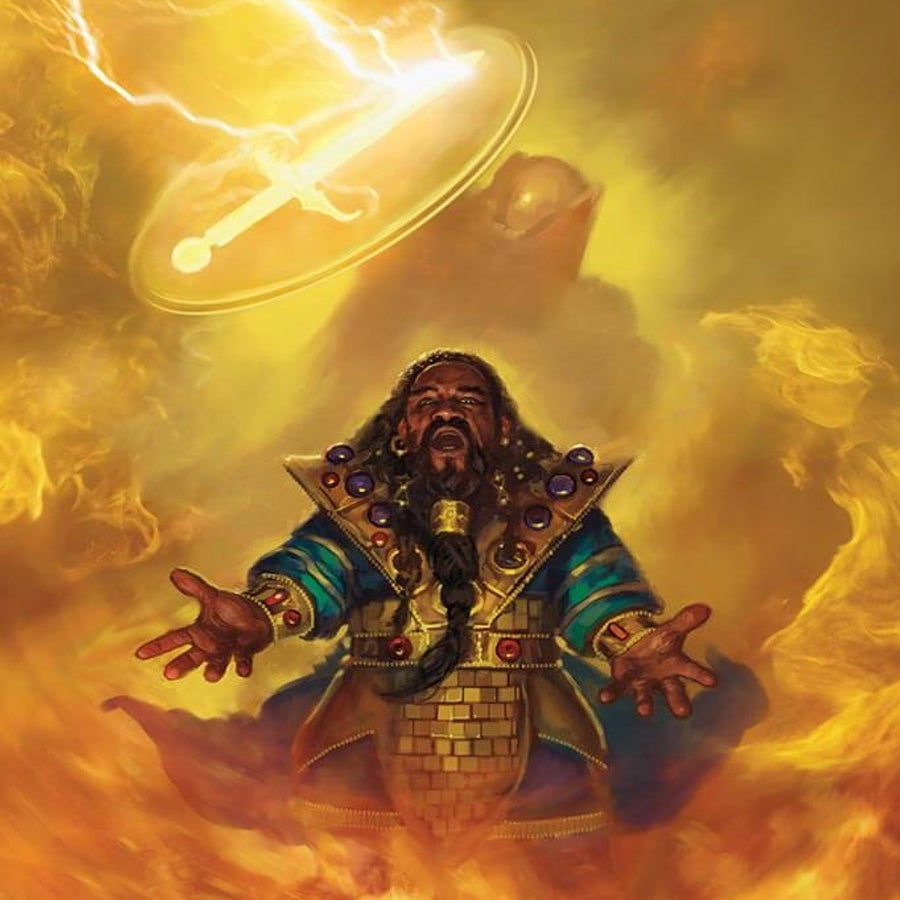
By Luke Hart
I have a standing agreement with my players: if they don’t use counterspell on me, I won’t use it on them. And why’s that? Because counterspell is one of the absolute worst game mechanics in D&D 5th edition, and I truly hope they obliterate it in the next edition, One D&D.
In fact, we dislike counterspell so much that my team and I created alternative spell dueling rules that replace counterspell. This spell dueling ruleset is available now in the November issue of Lair Magazine, Warfare & Wizardry, but that’s neither here nor now. Let’s talk about why counterspell sucks so badly.
Watch or listen to this article by clicking the video below.
1. It makes combat more boring.
Come on. Cool spells being flung across the battlefield, hero against villain, and villain against hero, are the things that amazing fantasy battles are made of. Not only does the spellcaster have that “cool factor,” but it makes combat way more interesting, fun, engaging, and dynamic.
Think about it: If we remove spellcasting and magical abilities from the game, what do we have in D&D? Heroes and villains going toe-to-toe and swinging swords and axes at each other. Or archers firing arrows into the fray. And since the core 5th edition gives us a few special tactics you can use in melee or ranged weapon combat—besides, what, push and grapple?—most combats of this nature really just turn into a contest of hit-point depletion. Roll dice, do damage, and see who runs out of health first.
See, spells and magic make things far more interesting. Sure, many spells just do damage, but so many of them don’t. In fact, as players mature and gain experience, they often find that the very best spells in the game don’t do damage but instead shift action economy—hypnotic pattern—split the battlefield—wall of force—or turn the enemy against each other—dominate person or monster. These sorts of effects are way more interesting than just rolling dice and doing damage, and that’s what counterspell does to the game: it removes this fantastical element of wizardry and divine magic that makes combats fun and dynamic.
Now, if counterspell had more to do with two spellcasters locking themselves in a contest of magical might to see who came out the victor—like our spell dueling rules do—it’d be much more cinematic and genre-appropriate. But it doesn’t do that. Instead, it’s just cast counterspell, and boop, the other spell ceases to go off. Sure, sometimes you might need to make a spellcasting check, but let’s be honest: the DC is pathetically low, and casters almost never fail it.
2. It prevents the players and the game master from playing the game.
The worst mechanics in D&D, or any RPG for that matter, are those that prevent you from playing the game. For instance, a spell like banishment takes a player completely out of the game. They don’t even get a saving throw at the end of each of their turns. It’s not save or suck; it’s save or say goodbye to the next hour of game time.
Counterspell does the same thing. If a player’s wizard was going to cast fireball—because pound for pound, it’s arguably the best spell in the game—but the enemy wizard counterspells it, that wizard does nothing that round. Oh, he can move about, and he can pout, but not much else. And then if it happens again on the next round of combat, and the next, and the next, the wizard player finds himself essentially doing NOTHING in the combat . . . besides stealing a tiny bit of action economy and spell slots from the enemy wizard—which is rather meaningless because enemy spellcasters usually don’t have to even worry about running out of spell slots, right? They only live for maybe 3 rounds anyway, so they can just go hogwild.
Of course, you can reverse this and have it be the player’s wizard that is counterspelling the enemy wizard. And we basically get the same thing. The enemy wizard is neutralized and can essentially do nothing in the combat, and the game master doesn’t get to use the cool spellcaster that they were looking forward to. Sure, the game master usually has other bad guys he runs in the combat—unless they committed the 2nd classic blunder in D&D: deploying an enemy spellcaster without giving them minions.
In case you were wondering, the first classic blunder is giving your players too many magic items at low level—don’t feel bad; most DMs have done that at least once.
So, yes, the game master isn’t totally screwed because they do have other monsters to play, but this can lead to an arms race. Not only do we get into shenanigans like counterspelling counterspells, but game masters can easily bring more than one spellcaster into a fight, ensuring that at least one can get their spells off. I mean, if the adventurers have a reputation for counterspelling, what intelligent Big Bad wouldn’t plan accordingly?
Of course, then players start thinking about how they can get around counterspell too, so they begin building sorcerers with subtle spell so their spells can’t be countered. And then game masters think to themselves, “Gee, that’s great; maybe all my spellcasters should be sorcerers with subtle spell, too.”
SO . . . you see how we just get an arms race that escalates and escalates and escalates—all because our beloved game designers decided to throw counterspell into the game? Thanks, guys!
That said, I must agree that the idea of two spellcasters going toe-to-toe, throwing their magical might against each other to determine who the stronger magic-user is, is, in fact, a really cool idea. That’s perhaps what they were going for with counterspell, but our spell dueling system that I’ve been using in my games for some time now captures this feeling far better. It allows you to pit one spellcaster against another in a contest of magical might and it brings back the idea of magical opposition school from previous editions—which they discarded in 5th edition for some reason—allowing you to gain bonuses to your attempt to counter the spell being cast.
3. It unfairly targets the game master.
Let’s consider the typical D&D adventure that contains, say, five different encounters, many of which are likely to become combats. Of those five encounters, not all will include enemy spellcasters, only maybe one or two—that’s just how adventures are usually designed, and it makes sense: there are fewer spellcasters in most D&D worlds than there are combatants that use weapons. So, what we find is that in at least three of those encounters, the players are able to cast their spells as desired, do cool things, and all that jazz. And that’s beautiful.
I want my players to have fun casting awesome spells. Then we get to the encounters with enemy spellcasters, and I’ll be honest with you, I get excited to use cool magical effects with my bad guys just as much as players enjoy casting their spells. It’s my turn to actively participate in that fantastical and magical part of the game. However, when I find my bad guy casters simply getting shut down with counterspell by the players’ casters, I can’t help but feel I’m missing out on a really cool, fun part of the game.
Now, yes, I am the game master, and I can do things to overcome this—for instance, the aforementioned arms race—but it’s still disappointing that a core game mechanic encourages, or even forces me, to do so. Of course, I’m sure there are many players who would scream that I’m NERFING character abilities by doing so, too. And they’re not completely wrong, but I would argue that they’re overlooking the fact that counterspell is just simply a bad game mechanic. It should never have been added to the game as-is.
Get Our Spell Dueling Rules!
We completely re-envisioned how counterspell should work, and created our new spell dueling rules, available in Warfare & Wizardry, the November 2022 issue of Lair Magazine. You’ll also get other option rules such as
- Opposition schools
- Universal spells
- Spell preparation options
- Concentration options
- Feat: split focus
Get more bang for your buck with Lair Magazine Bundle: Issues 22-24 which contains everything above plus our Naval Combat Ruleset, several 5e adventures, new monsters, encounters, traps, and more!
-
Posted in
Game Master How-To Articles

